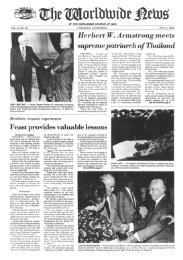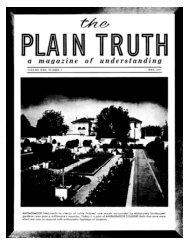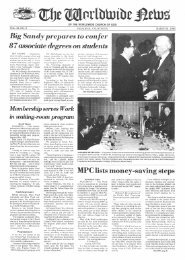PT Sep-78 - Herbert W. Armstrong Library and Archives
PT Sep-78 - Herbert W. Armstrong Library and Archives
PT Sep-78 - Herbert W. Armstrong Library and Archives
You also want an ePaper? Increase the reach of your titles
YUMPU automatically turns print PDFs into web optimized ePapers that Google loves.
new gimmicks <strong>and</strong> games, the<br />
amount of revenue generated is disappointingly<br />
small <strong>and</strong> tends to<br />
drop after some months.<br />
Counting the Total Cost<br />
And finally, there is the moral dilemma<br />
of a state allowing, even encouraging,<br />
people to gamble so that<br />
it may enrich its coffers at their ex<br />
. pense. Gambling is, after all, a losing<br />
proposition for nearly everyone<br />
who participates. The odds are<br />
against the players. The lucky few<br />
who win jackpots or even a state<br />
lottery worth $1 million do so at the<br />
expense of millions of others, some<br />
who can't afford to gamble at all.<br />
Studies indicate that legalized<br />
gambling increases the number of<br />
compulsive gamblers. Membership<br />
in Gamblers Anonymous has grown<br />
dramatically in states that sanction<br />
gambling. Estimates of the number<br />
of compulsive gamblers in the U.S.<br />
range from one to nine million. The<br />
higher figure would put the problem<br />
on a par with alcoholism. The grief<br />
<strong>and</strong> financial hardship that compulsive<br />
gambling brings to individuals<br />
<strong>and</strong> families should also be<br />
weighed in any decision to permit<br />
legalized gambling, authorities contend.<br />
Psychiatrist Robert Custer, chief<br />
of the Veterans Administration's<br />
mental health programs <strong>and</strong> an expert<br />
on gambling addiction, contends<br />
that if states promote<br />
wagering they should also provide<br />
treatment programs for those who<br />
become compulsive gamblers.<br />
"The states don't want to hear<br />
about that obligation," he says. "Legalized<br />
gambling is moving much<br />
too fast for professionals concerned<br />
with analyzing the potential dangers,<br />
but the states aren't waiting<br />
around for us."<br />
To those who like the idea of<br />
dropping strictures against gambling,<br />
Dr. Craig Walton, professor<br />
of philosophy at the University of<br />
Nevada, Las Vegas, replies: "There<br />
are others who say, 'I know in my<br />
gut that it's wrong, <strong>and</strong> don't give<br />
me any of your sociology. It's bad<br />
<strong>and</strong> I can't tell you why it's bad, but<br />
it is, so don't argue with me.' "<br />
He believes that the argument<br />
The PLAIN TRUTH <strong>Sep</strong>tember 19<strong>78</strong><br />
that gambling is a victimless business<br />
is probably wrong. "If you<br />
want a ledger, let's make a real ledger,<br />
not just the amount of money<br />
that went into casinos <strong>and</strong> hotels,<br />
<strong>and</strong> the amount that came out.<br />
What if we pulled back the curtains<br />
<strong>and</strong> looked at some of the other<br />
costs [crime, financial hardship,<br />
regressive taxation)?"<br />
Unfortunately, measuring the total<br />
cost <strong>and</strong> impact of gambling on a<br />
community, such as Atlantic City, is<br />
not easy to do. It's the profit or<br />
losses of the gambling operation itself<br />
that draw the most attention<br />
<strong>and</strong> will probably be the decisive<br />
factor in determining the future of<br />
gambling in the New Jersey resort<br />
city <strong>and</strong> elsewhere.<br />
So far, investing in Atlantic City'S<br />
first casino has been a safe bet for<br />
Resorts International. In the first<br />
month of operation the casino had<br />
an average gross take of over<br />
$400,000 a day. Other hotel owners<br />
<strong>and</strong> investors who have waited to<br />
see how the first casino fares have<br />
begun to move. Less than a month<br />
after the first casino opened, Caesar's<br />
World, Inc., which owns <strong>and</strong><br />
operates the Caesar's Palace. hotelcasino<br />
in Las Vegas, announced a<br />
lease arrangement with the Howard<br />
Johnson Regency Hotel in Atlantic<br />
City which would make it the second<br />
casino operator in the New Jersey<br />
resort. It plans a $30 million<br />
expansion project to enlarge the hotel<br />
<strong>and</strong> build a 52,000-square-foot<br />
casino. Caesar's also holds a long:<br />
term lease for the former site of another<br />
hotel in Atlantic City, <strong>and</strong> the<br />
company says it intends to pursue<br />
plans to build a $100 million . hotelcasino<br />
there in the next few years.<br />
Atlantic City Mayor Joseph Lasarow<br />
envisions gambling centers<br />
opening at the rate of one or two a<br />
year until the total reaches 15 to 19<br />
permitted under present zoning<br />
rules.<br />
The apparent success of casino<br />
gambling in Atlantic City will give<br />
added impetus to efforts to legalize<br />
casino gambling in other states.<br />
They want that glittering pot of gold<br />
at the end of the rainbow, even if it<br />
means misfortune <strong>and</strong> financial<br />
hardship for millions of others. 0<br />
29

















